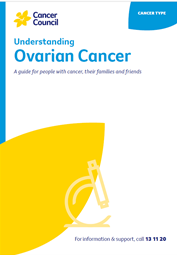- Home
- Ovarian cancer
- Diagnosis
- Your health care team
Your health care team
Your general practitioner (GP) will arrange the first tests to assess your symptoms. If these tests do not rule out cancer, you will usually be referred to a specialist called a gynaecological oncologist. The specialist will arrange further tests.
If ovarian cancer is diagnosed, the specialist will consider treatment options. Often these will be discussed with other health professionals at what is known as a multidisciplinary team (MDT) meeting. During and after treatment, you will see a range of health professionals who specialise in different aspects of your care.
To find cancer specialists, multidisciplinary teams and hospitals in NSW or ACT, you can visit the NSW Government website CanRefer.
Health professionals you may see
| GP | assists you with treatment decisions and works in partnership with your specialists in providing ongoing care |
| gynaecological oncologist* | diagnoses and performs surgery for cancers of the female reproductive system, e.g. ovarian, cervical, uterine, vulvar and vaginal cancers |
| gynaecological pathologist* | examines tissue removed from the abdomen or ovaries under a microscope |
| medical oncologist* | treats cancer with drug therapies such as chemotherapy and targeted therapy (systemic treatment) |
| radiation oncologist* | treats cancer by prescribing and overseeing a course of radiation therapy |
| radiation therapist | plans and delivers radiation therapy |
| radiologist* | reads and interprets diagnostic scans, such as x-rays and CT and PET scans |
| cancer care coordinator | coordinates your care, liaises with other members of the MDT and supports you and your family throughout treatment; care may also be coordinated by a clinical nurse consultant (CNC) or clinical nurse specialist (CNS) |
| nurse | administers drugs and provides care, information and support throughout treatment |
| occupational therapist | assists in adapting your living and working environment to help you resume usual activities after treatment |
| physiotherapist | helps with restoring movement and mobility, and preventing further injury |
| exercise physiologist | prescribes exercise to help people with medical conditions improve their overall health, fitness, strength and energy levels |
| dietitian | helps with nutrition concerns and recommends changes to diet during treatment and recovery |
| social worker | links you to support services and helps you with emotional, practical and financial issues |
| counsellor | help you manage your emotional response to diagnosis and treatment |
| clinical psychologist | uses evidence-based strategies to help you manage emotional conditions, usually in the long term |
| palliative care specialists* and nurses | work closely with the GP and cancer specialists to help control symptoms and maintain quality of life |
| family cancer specialist*, genetic counsellor | provide advice about genetic causes of ovarian cancer; arrange genetic test results if required and interpret the results for you and your family |
→ READ MORE: Ovarian cancer treatment
Podcast for people affected by cancer
Listen now
More resources
Dr Nisha Jagasia, Gynaecological Oncologist, Mater Hospital Brisbane, QLD; Sue Hayes, Consumer; Bronwyn Jennings, Gynaecology Oncology Clinical Nurse Consultant, Mater Health, QLD; Dr Andrew Lee, Radiation Oncologist, Canberra Region Cancer Centre and Canberra Hospital, ACT; A/Prof Tarek Meniawy, Medical Oncologist, Sir Charles Gairdner Hospital, WA; Caitriona Nienaber, Cancer Council WA; Jane Power, Consumer; A/Prof Sam Saidi, Senior Staff Specialist, Gynaecological Oncology, Chris O’Brien Lifehouse, NSW
View the Cancer Council NSW editorial policy.
View all publications or call 13 11 20 for free printed copies.
Need to talk?
Support services
Coping with cancer?
Ask a health professional or someone who’s been there, or find a support group or forum
Need legal and financial assistance?
Practical advice and support during and after treatment
Cancer Information
Dealing with the diagnosis
Common reactions to a cancer diagnosis and how to find hope
Your coping toolbox
Ways to cope with the challenges caused by cancer

